In Focus: The enduring beauty of Thomas Gray's Elegy Written In A Country Churchyard
Jack Watkins considers the timeless brilliance of Thomas Gray's 'Elegy Written in a Country Churchyard.'

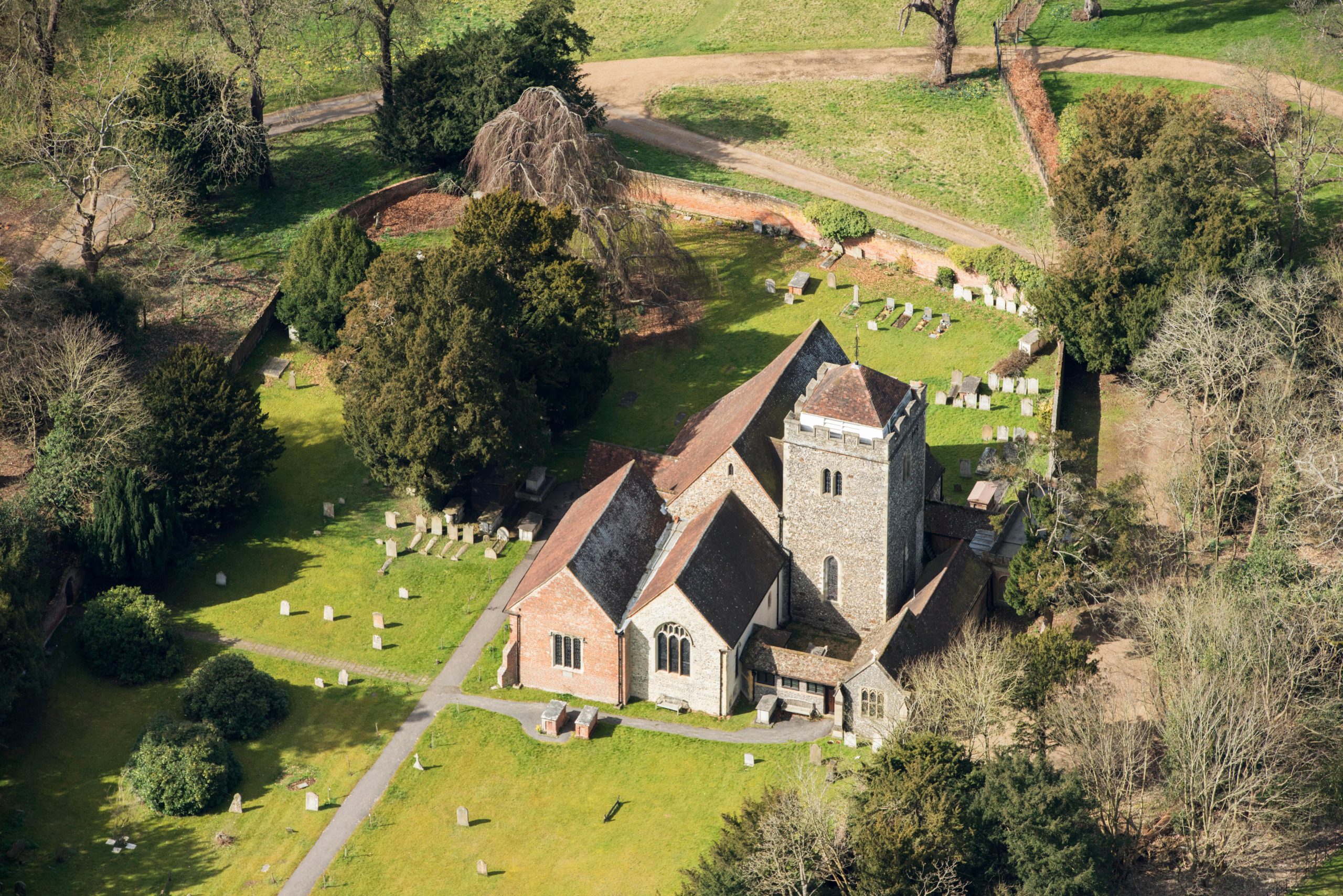
Exquisite houses, the beauty of Nature, and how to get the most from your life, straight to your inbox.
You are now subscribed
Your newsletter sign-up was successful
Jump down to read the full poem.
Thomas Gray may no longer be the most famous name in British poetry, but if any lines of 18th-century verse still quoted in the 21st century can be expected to draw even the vaguest nods of recognition, several of his surely qualify. ‘Where Ignorance is bliss/’Tis folly to be wise,’ from Ode on a Distant Prospect of Eton College is one example. Extracts from his Elegy Written In A Country Churchyard have also become part of the literary heritage: ‘Full many a flower is born to blush unseen,/And waste its sweetness on the desert air’; ‘Far from the madding Crowd’s ignoble strife’; and a reference to life’s ‘cool sequestered vale’ undoubtedly carry a familiar ring.
However, Gray (1716–71) would have been content for his name to rest in anonymity, his poems only circulating among his associates. The London-born son of a City scrivener, he was educated at Eton between 1725 and 1734, where one of his closest friends was Horace Walpole, who would arrange for the first, anonymous, publication of Gray’s odes in 1747. Like Walpole, Gray attended Cambridge, but, although his intention was to prepare for a career as a London barrister, he returned to the university city after taking a two-year Grand Tour of Europe in the company of Walpole between 1739–41. In Cambridge, pursuing his literary interests as a gentleman scholar, he would effectively live for the remainder of his life.
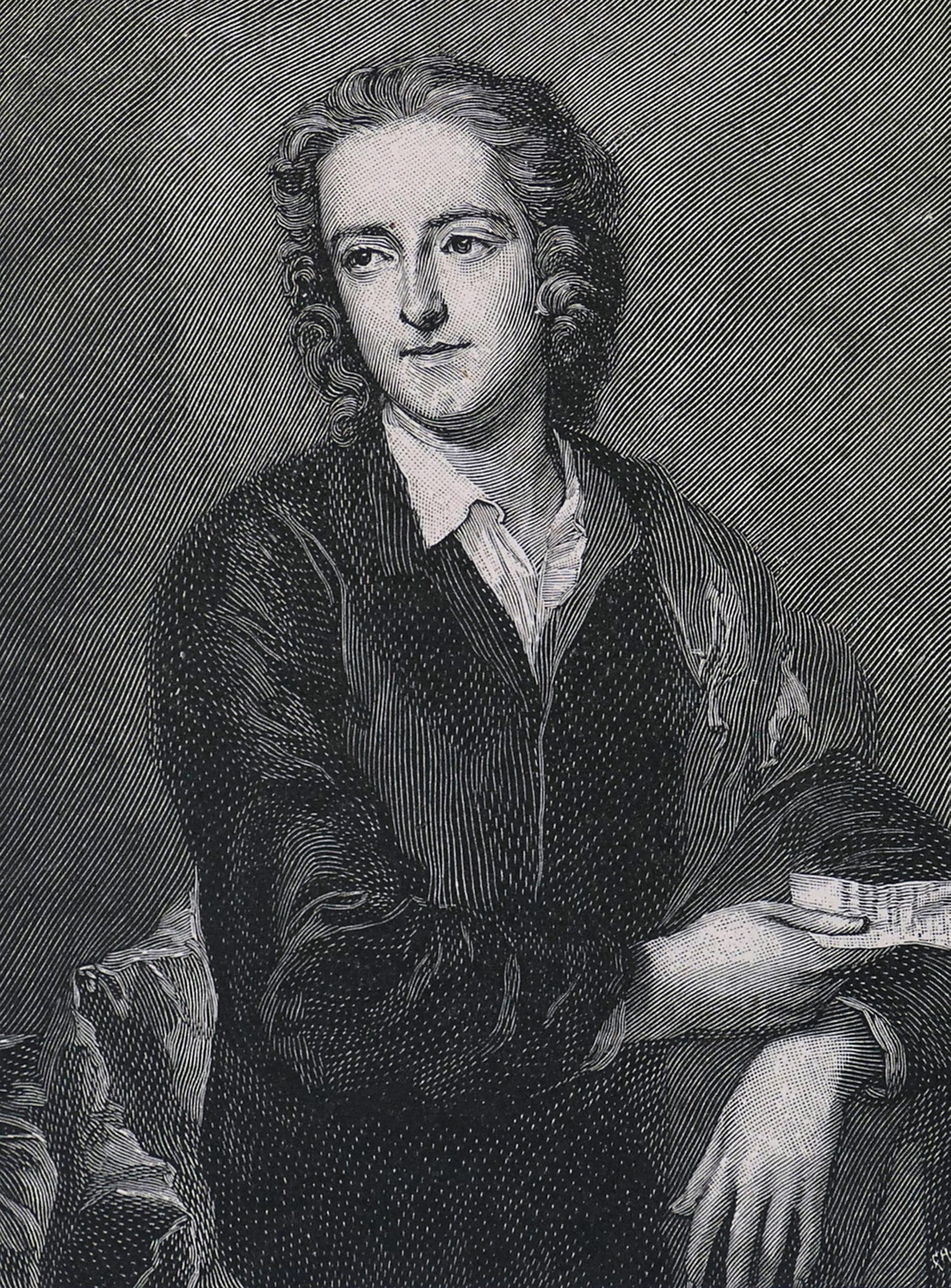
Gray had begun writing English language poetry in the early 1740s, and Elegy may have had its origins in some lines penned on the death of another of his Eton friends, Richard West, in 1742, an event that caused him much grief. In fact, Gray had unknowingly sent West what has been adjudged as his first significant poem, Ode on the Spring, on the very day of the latter’s death from tuberculosis. Gray’s valuing of rustic simplicity above the ardour of the Crowd (‘How low, how little are the proud/How indigent the Great!’) is an early introduction to the mood of Elegy: ‘The curfew tolls the knell of parting day,/The lowing herd wind slowly o’er the lea,/The plowman homeward plods his weary way,/And leaves the world to darkness and to me.’
Elegy was completed in 1750 in Stoke Poges, Buckinghamshire, where Gray’s mother and aunt had lived for a number of years, and where he spent his summers, regularly attending Sunday services at St Giles’s church. A letter to Walpole accompanying the poem, referring to it as ‘a thing to which he had at last put an end’, suggests Gray considered it unexceptional, although his friend immediately spotted its quality.
St Giles’s Church, Stoke Poges
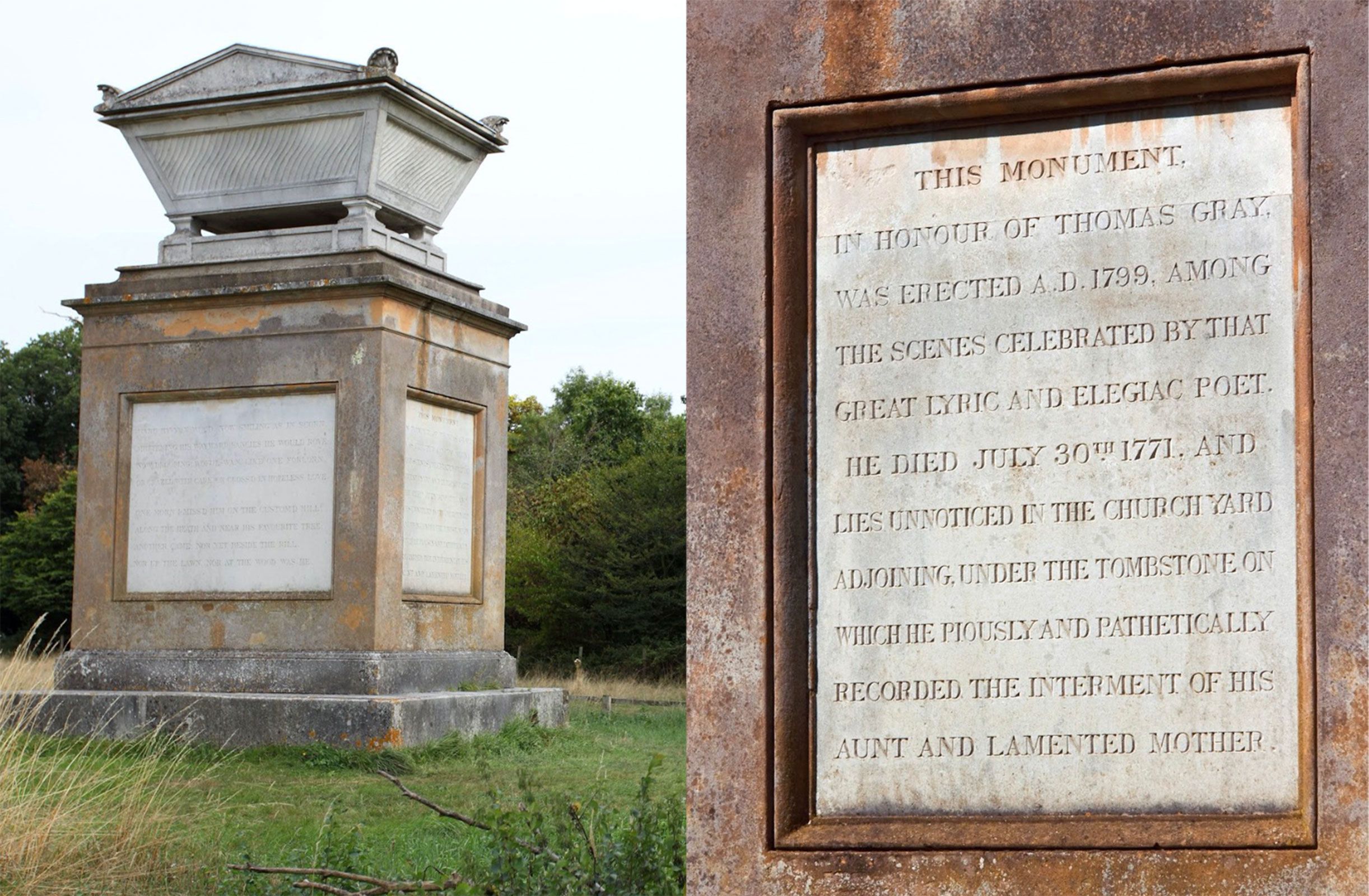
It is a story disputed by some, but a strong tradition associates the churchyard described in Gray’s Elegy with that of St Giles’s, in the quiet Buckinghamshire village of Stoke Poges, where the poem was finished in 1750. The poet was buried at the church after his death, aged 54, in 1771, being laid to rest in a chest tomb alongside his mother, Dorothy, and aunt, Mary Antrobus.There is a memorial to Gray in the east aisle of Westminster Abbey’s Poets’ Corner. However, literary pilgrims are also drawn to the huge monument erected in his honour to be found beyond St Giles’s churchyard. This enormous stone pedestal (above), almost 20ft high, was designed by the eminent architect James Wyatt on behalf of John Penn of Stoke Park in 1799. The monument was later purchased by villagers concerned for its future protection and presented to the National Trust in 1925.
After Walpole had shown copies of the poem to several of his circle, it came to the attention of the publishers of the monthly periodical Magazine of Magazines. When they indicated their intention to publish the poem, as permitted by the copyright laws of the day, Gray hurried to persuade Walpole to ask his publisher to print the poem immediately, although still without naming him as its author.
Despite this, the machinations of Magazine of Magazines had ensured that Gray’s cover was blown and, in any case, the poem was an immediate success. However, Gray’s retiring nature and his fear that his poems would be ‘mistaken for the works of a flea’ meant that he only published 13 of them in his lifetime. He also turned down an offer of the Poet Laureateship in 1757.
Exquisite houses, the beauty of Nature, and how to get the most from your life, straight to your inbox.
His later years were devoted to antiquarian and botanical pursuits and travels, leaving Elegy to stand as his most famous work, admired for its atmospheric opening and natural setting, its images of rugged elms, shady yews and toiling farm workers. In its calm, brooding contemplation of the obscure destinies of villagers, each now in their narrow cell forever laid beneath the churchyard turf, it reminds us of the inevitable fate that makes equals of us all.
Reaction to the poem
‘Gentlemen, I would rather have written that Poem than take Quebec tomorrow’ General James Wolfe’s attributed comment to his men on the eve of the Battle of Quebec, 1759
‘With the exception of certain works of Byron and Shakespeare, no English poem has been so widely admired or imitated abroad and after more than a century of existence we find it as fresh as ever’ Edmund Gosse, 19th-century critic
‘Gray’s Elegy is one of the greatest poems of the English language; to many readers, learned and otherwise, it has stood almost for the idea of poetry itself’ Oxford Dictionary of National Biography
Elegy in a Country Churchyard by Thomas Gray
The curfew tolls the knell of parting day,
The lowing herd winds slowly o'er the lea,
The ploughman homeward plods his weary way,
And leaves the world to darkness and to me.
Now fades the glimmering landscape on the sight,
And all the air a solemn stillness holds,
Save where the beetle wheels his droning flight,
And drowsy tinklings lull the distant folds:
Save that from yonder ivy-mantled tower
The moping owl does to the moon complain
Of such as, wandering near her secret bower,
Molest her ancient solitary reign.
Beneath those rugged elms, that yew-tree's shade
Where heaves the turf in many a mouldering heap,
Each in his narrow cell for ever laid,
The rude Forefathers of the hamlet sleep.
The breezy call of incense-breathing morn,
The swallow twittering from the straw-built shed,
The cock's shrill clarion, or the echoing horn,
No more shall rouse them from their lowly bed.
For them no more the blazing hearth shall burn
Or busy housewife ply her evening care:
No children run to lisp their sire's return,
Or climb his knees the envied kiss to share.
Oft did the harvest to their sickle yield,
Their furrow oft the stubborn glebe has broke;
How jocund did they drive their team afield!
How bow'd the woods beneath their sturdy stroke!
Let not Ambition mock their useful toil,
Their homely joys, and destiny obscure;
Nor Grandeur hear with a disdainful smile
The short and simple annals of the Poor.
The boast of heraldry, the pomp of power,
And all that beauty, all that wealth e'er gave
Awaits alike th' inevitable hour:—
The paths of glory lead but to the grave.
Nor you, ye Proud, impute to these the fault
If Memory o'er their tomb no trophies raise,
Where through the long-drawn aisle and fretted vault
The pealing anthem swells the note of praise.
Can storied urn or animated bust
Back to its mansion call the fleeting breath,
Can Honour's voice provoke the silent dust,
Or Flattery soothe the dull cold ear of Death?
Perhaps in this neglected spot is laid
Some heart once pregnant with celestial fire;
Hands, that the rod of empire might have sway'd,
Or waked to ecstasy the living lyre:
But Knowledge to their eyes her ample page,
Rich with the spoils of time, did ne'er unroll;
Chill Penury repress'd their noble rage,
And froze the genial current of the soul.
Full many a gem of purest ray serene
The dark unfathom'd caves of ocean bear:
Full many a flower is born to blush unseen,
And waste its sweetness on the desert air.
Some village-Hampden, that with dauntless breast
The little tyrant of his fields withstood,
Some mute inglorious Milton here may rest,
Some Cromwell, guiltless of his country's blood.
Th' applause of listening senates to command,
The threats of pain and ruin to despise,
To scatter plenty o'er a smiling land,
And read their history in a nation's eyes
Their lot forbad: nor circumscribed alone
Their growing virtues, but their crimes confined;
Forbad to wade through slaughter to a throne,
And shut the gates of mercy on mankind;
The struggling pangs of conscious truth to hide,
To quench the blushes of ingenuous shame,
Or heap the shrine of Luxury and Pride
With incense kindled at the Muse's flame.
Far from the madding crowd's ignoble strife
Their sober wishes never learn'd to stray;
Along the cool sequester'd vale of life
They kept the noiseless tenour of their way.
Yet e'en these bones from insult to protect
Some frail memorial still erected nigh,
With uncouth rhymes and shapeless sculpture deck'd,
Implores the passing tribute of a sigh.
Their name, their years, spelt by th' unletter'd Muse,
The place of fame and elegy supply:
And many a holy text around she strews,
That teach the rustic moralist to die.
For who, to dumb forgetfulness a prey,
This pleasing anxious being e'er resign'd,
Left the warm precincts of the cheerful day,
Nor cast one longing lingering look behind?
On some fond breast the parting soul relies,
Some pious drops the closing eye requires;
E'en from the tomb the voice of Nature cries,
E'en in our ashes live their wonted fires.
For thee, who, mindful of th' unhonour'd dead,
Dost in these lines their artless tale relate;
If chance, by lonely Contemplation led,
Some kindred spirit shall enquire thy fate,—
Haply some hoary-headed swain may say,
'Oft have we seen him at the peep of dawn
Brushing with hasty steps the dews away,
To meet the sun upon the upland lawn;
'There at the foot of yonder nodding beech
That wreathes its old fantastic roots so high,
His listless length at noon-tide would he stretch,
And pore upon the brook that babbles by.
'Hard by yon wood, now smiling as in scorn,
Muttering his wayward fancies he would rove;
Now drooping, woeful-wan, like one forlorn,
Or crazed with care, or cross'd in hopeless love.
'One morn I miss'd him on the custom'd hill,
Along the heath, and near his favourite tree;
Another came; nor yet beside the rill,
Nor up the lawn, nor at the wood was he;
'The next with dirges due in sad array
Slow through the church-way path we saw him borne,—
Approach and read (for thou canst read) the lay
Graved on the stone beneath yon agèd thorn:'
The Epitaph
Here rests his head upon the lap of Earth
A youth, to Fortune and to Fame unknown;
Fair Science frown'd not on his humble birth
And Melancholy mark'd him for her own.
Large was his bounty, and his soul sincere;
Heaven did a recompense as largely send:
He gave to Mis'ry all he had, a tear,
He gain'd from Heaven, 'twas all he wish'd, a friend.
No farther seek his merits to disclose,
Or draw his frailties from their dread abode,
(There they alike in trembling hope repose,)
The bosom of his Father and his God.
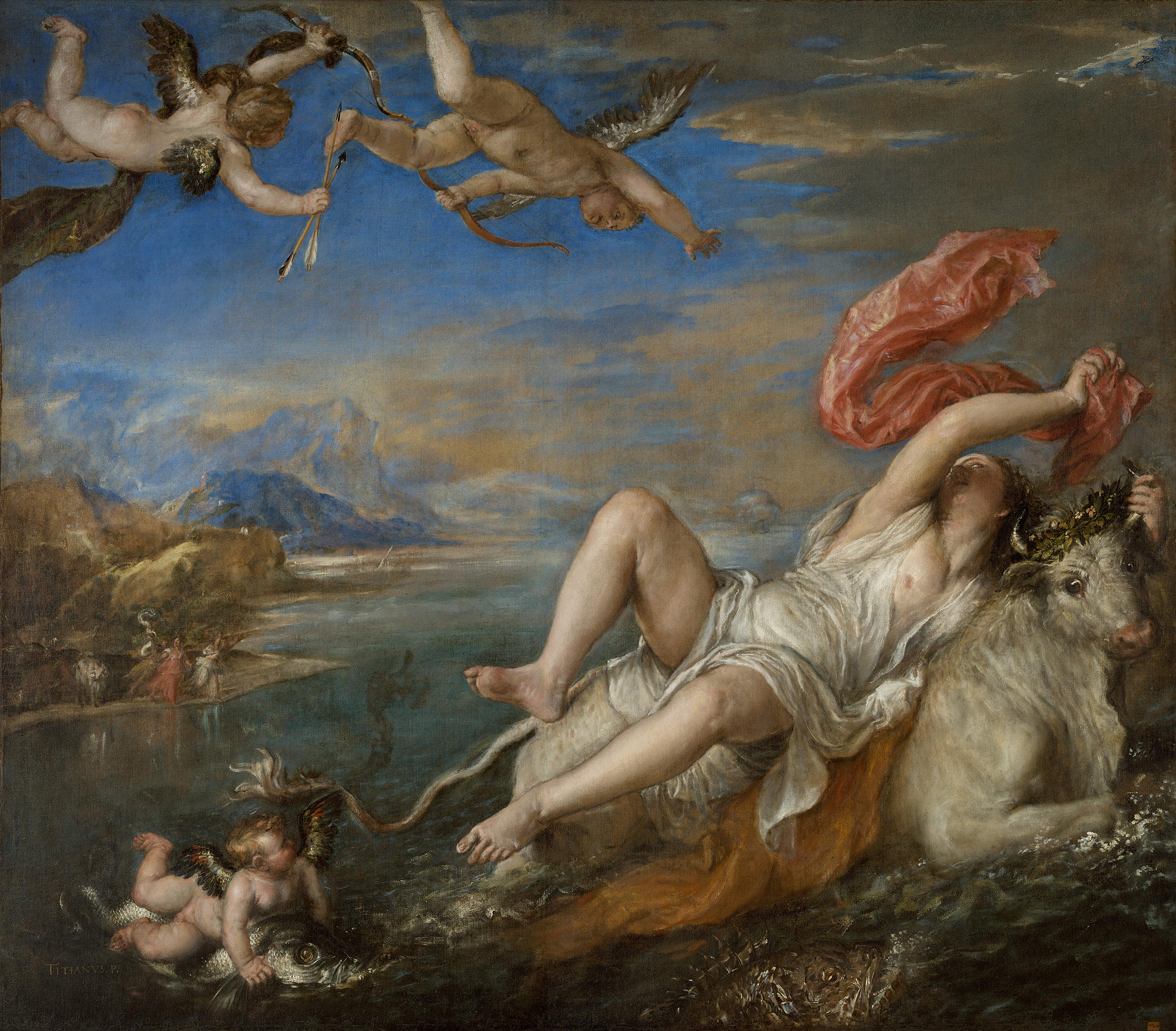
In Focus: The six ‘poems in paint’ by Titian that are in the same room for the first time in 500 years
Michael Prodger heralds the ‘Titian: Love, Desire, Death’ exhibition at the National Gallery, a once-in-a-lifetime collection of a group of
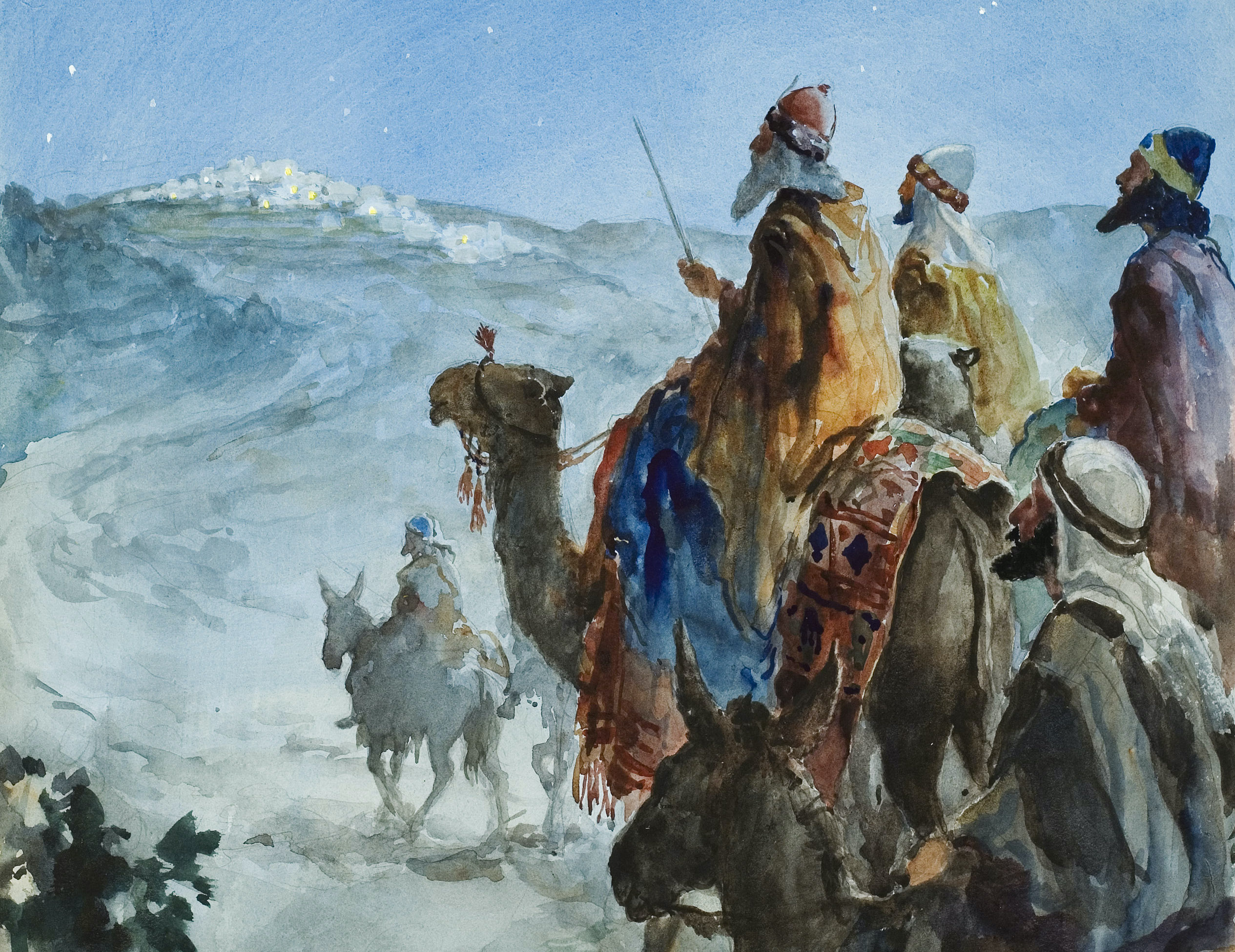
In Focus: T.S. Eliot's Journey of the Magi, the masterpiece that was dashed off in 45 minutes
Far from a celebration, the poem is a metaphor for the voyage Eliot believed the human spirit must make to
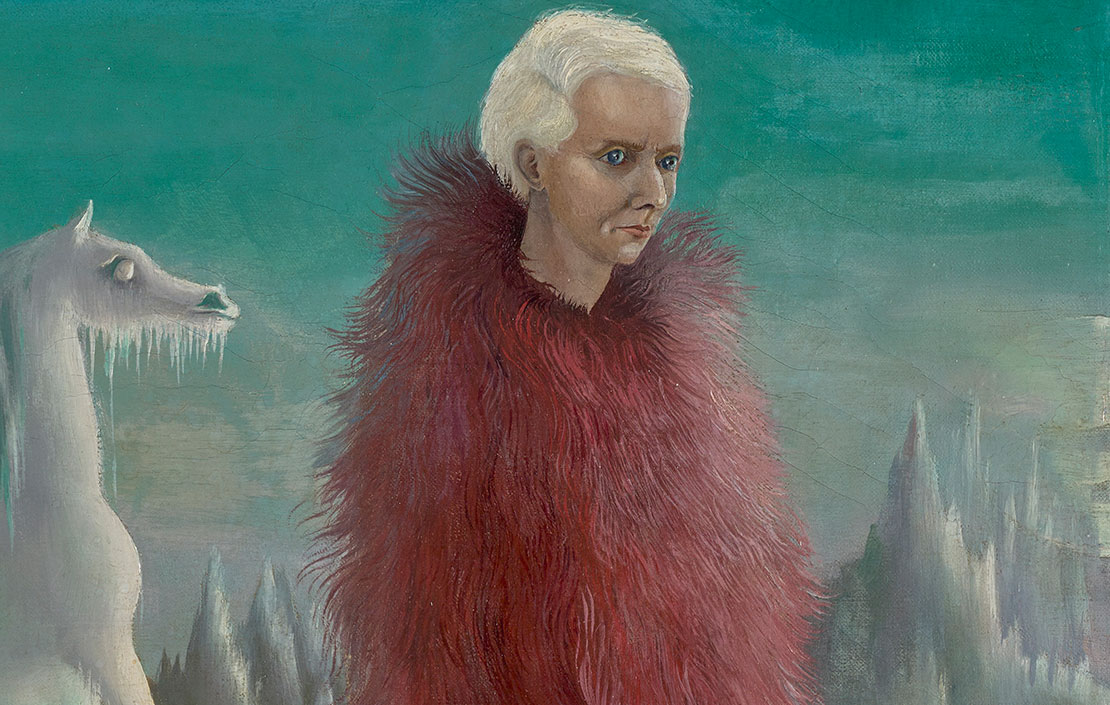
In Focus: Leonora Carrington's extraordinary portrayal of Max Ernst, the surrealist pioneer who inspired Dalí
A stunning portrait of Max Ernst, one of the key figures in 20th century art, is at the heart of
Jack Watkins has written on conservation and Nature for The Independent, The Guardian and The Daily Telegraph. He also writes about lost London, history, ghosts — and on early rock 'n' roll, soul and the neglected art of crooning for various music magazines
